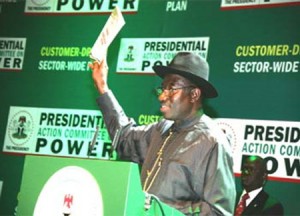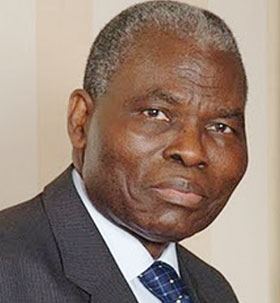Electricity Reforms May Be Fizzling Out
The vigour with which the Federal Government initially pursued its electricity reforms may be fizzling out.
The expectation of stable electricity supply is now giving way to the fear that not much should be expected from the sector, especially in the light of the inability of the Federal Government to implement deadlines for meeting its set targets.
Senior electricity sector officials are worried about the political will of the new Minister of State for Power, Hajia Zainab Ibrahim Kuchi, to jumpstart the reform initiatives, as she has no prior industry initiative.
Former minister, Prof. Barth Nnaji, left office in late August 2012 following allegations of conflict of interest. Since then, the political will to drive the reforms has largely been absent, which was why President Goodluck Jonathan reassigned former Minister of State for Power, Mr. Darius Dickson Ishaku, to the Ministry of Niger Delta Affairs.
The swapping of positions by the ministers was as a result of President Jonathan’s disappointment with the direction of the power reform initiatives under Ishaku. This came from his inability to rise up to the challenge of making the ministry to meet up with the goals of ensuring regular supply of electricity.
There have been complaints of increasing inefficiency in the ministry and consistent drop in electricity supply. And “the business as usual” disposition by the bureaucracy and their contractor friends started appearing again. In fact, Chief Executive Officers (CEOs) of power generation and distribution companies lightly approach delivering the schedule on power supply to major cities. This resulted in the loss of the electricity supply, which improved greatly to a peak by July 2012.
And more than two months after a Canadian firm, Manitoba Hydro International (MHI), won the three-year contract to manage the Transmission Company of Nigeria (TCN), the takeover order has not been executed by the Ministry of Power. This has put to a stop the takeoff of measures towards the stabilisation and security of the national grid, reduction of electricity losses during transmission and workers reorientation, which are part of the key objectives of the contract.
Under the electricity reform measures, the TCN combines the functions of transmission services provider and system operators with those of market operators. For the TCN, the management contractor is to provide efficient management of government investments and ensure adequate and equitable generation dispatch, according to merit and sound regulatory principles. It will also ensure fair market settlements between electricity traders and provide for skills and expertise transfer to the Nigerian counterparts who will serve as deputies and in other positions among the management staff of the management contractor.
Manitoba Hydro International (MHI) was scheduled to take over TCN on September 1, 2012 in the management contract worth $23 million (N3.68 billion). But up till yesterday, the government has not named a supervisory board of about seven persons that will work alongside the incoming TCN expatriate firm’s management.
Yet, MHI has been in Nigeria since the end of July, already drawing funds from the contract through the advance payment of commitment sum of $2.5 million (N400 million) with the signing of the contract between the Director General, Bureau for Public Enterprises (BPE), Bolanle Onagoruwa and Lonrne Halpenny, Managing Director of MHI on July 23, 2012.
But instead of working to constitute the supervisory board of the new TCN, some interest groups are scheming for a review in the management contract between Nigeria and MHI. Under the contract, MHI will have on ground eight expatriate principal management workers who would be in charge of the offices of the Chief Operating Officer (COO) and directors of Transmission Service Provider, System Operations, Market Operations, Finance Director, ICT, National Control Centre, Human Resource.
But some who are opposed to the management concession including union and senior officials of the Ministry of Power want the contract reviewed so that Nigerian officials of the old order in TCN can provide directors for the departments of market operations, finance and National Control Centre.
A source told The Guardian: “Their own interest is just to continue to be in control of the money accruing to the TCN and continue to disburse the funds as soft money. They want the old system to continue. The forces stalling the takeoff of the TCN by the MHI are worried about the direction of the money flow, not the efficiency of the power sector. But what they don’t know is that unlike under the current system, what will be passing through from the National Control Centre, market operations and the finance director is virtual money and the cash and carry system.”
Under the reforms, MHI will work with 30 associate Nigerian workers. The current CEOs of TCN would become deputies to the eight expatriate MHI workers. After six months, the CEOs can be changed with other Nigerian senior executives by MHI if they are not found to be assets to the full realisation of the specifics of the contract.
And to ensure a seamless transition from the current leadership of TCN and incoming MHI executives, a workshop and briefing session between the new managers and the workers was held on July 26, 2012 to sensitise them of TCN, allay their fears and secure their commitment to the execution of the contract agreement. This became imperative because of protests by labour unions against the takeover of the TCN by new managers. The workers had insisted that government must resolve all outstanding labour issues before the final sale of the PHCN to private investors or takeover of the TCN by MHI.
The TCN is one of the 18 successor firms unbundled from the former Power Holding Company of Nigeria (PHCN). But unlike the 17 others slated for either outright privatisation or sale of equity, it was slated for management contract, meaning that it is firmly in government control but managed by world class power sector firm.
Nigeria’s power reform roadmap is anchored on the establishment of an independent regulator for the sector (Nigerian Electricity Regulatory Commission (NERC), setting up of the commercial framework for the sector (via cost reflective electricity tariffs) and the Nigerian Bulk Electricity Trading Company (bulk trader), privatisation of PHCN’s six successor generation companies and 11 PHCN successor distribution companies, and the continued strengthening of the fuel-to-power segment.
Source: Guardian









